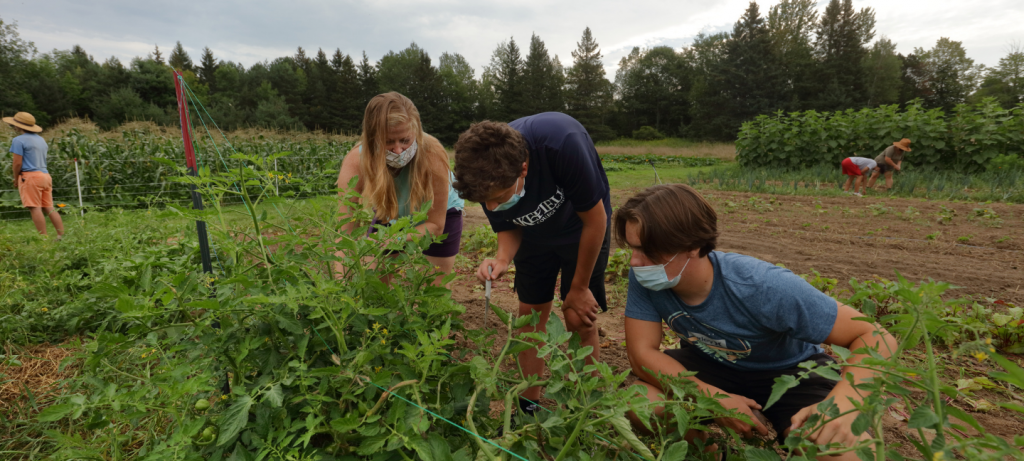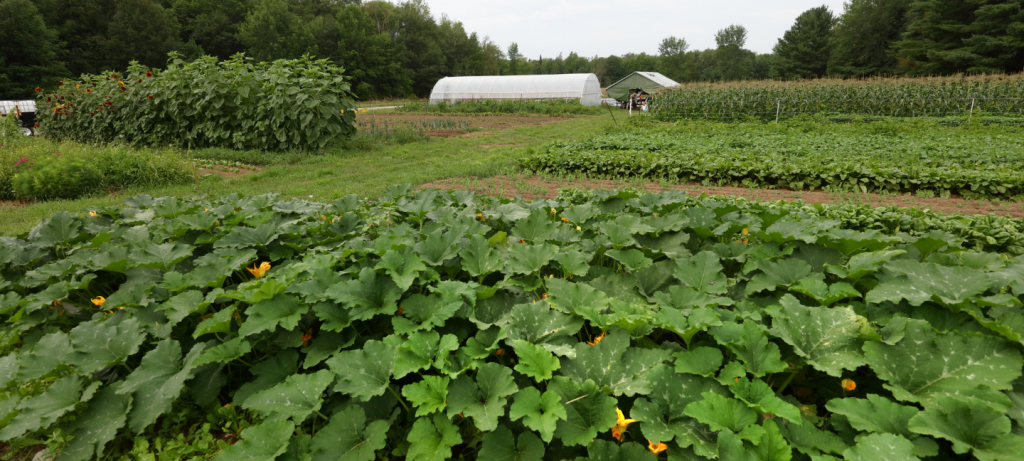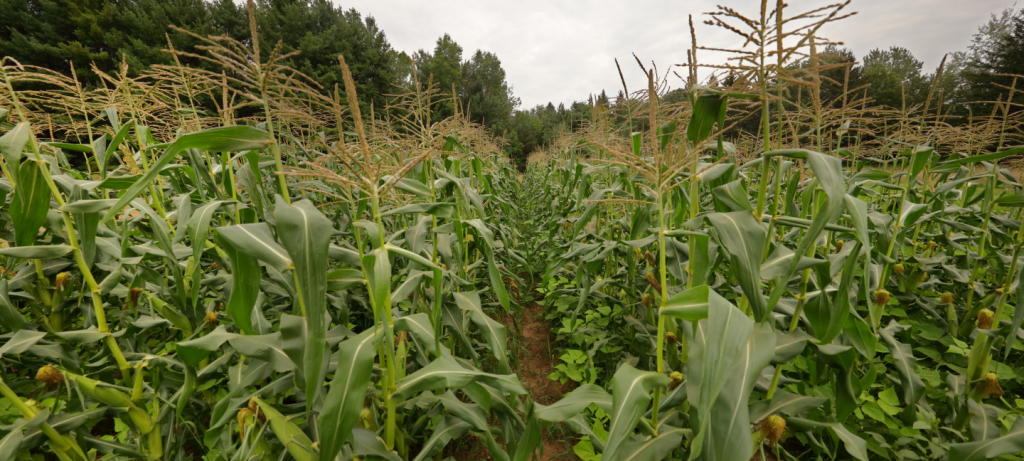
For years, students at Lakefield College School have found themselves outdoors nearly every day in the school’s 315-acre waterfront setting on the edge of the rugged Canadian Shield. It’s a way of life at LCS, part of the philosophy of “healthy body, healthy mind” that the school has always endorsed and a natural byproduct of its surrounding lake, fields and forests. Today, it has even been elevated to strategy and lives within the school’s plan under its Outdoors Every Day pillar.
This passion for the environment as, at once, an outdoor classroom and a fountainhead of mental and physical health is now taking a more intentional focus encompassing sustainability and environmental responsibility. Front and centre is a separate 160-acre property, Northcote Campus, where students will learn about regenerative farming, entrepreneurship and culinary skills through an immersive, authentic experience.
Supporting the farm campus and its mission is a matrix of new initiatives—a new campus master plan guided by the principle of regenerative design, a web of community relationships that draws on local farming expertise and experience, and a new Assistant Head: Sustainability role as of January 2022 to oversee it all.
It’s a move that puts LCS at the forefront of environmental education and sustainable living. “Issues surrounding climate change make it imperative for schools to educate and offer alternatives in this area,” says Anne-Marie Kee, Head of School and Foundation. “This is a pivotal moment for us. There isn’t anything more important that we could be doing than to put environmental responsibility as a top priority in the minds of our students. This is where the world is at right now.”
The farm kicked off what will be a new curricular arm for LCS with a summer program this year called From Seed to Table: Adventures in Eco-Farming. With support from nearby Trent University (Lakefield’s new farmer is a recent sustainable agriculture and food systems graduate and the course teacher is a Masters graduate of the sustainability studies program), the curriculum covers regenerative farming techniques such as crop diversity and soil management, food security, management for farm- and food-related businesses, the history of food systems including early Indigenous agricultural techniques and culinary skills, so that students can enjoy the products of their labour.
“It will be important to differentiate Northcote from the main campus while allowing all our programs to draw upon its magic,” says Allyson Brown, the Seed To Table teacher and program leader. “We see it as a chance for students to take control over their own learning, where they can explore a concept and find solutions in a separate, inspiring space.”
Northcote, which lies a few kilometres to the north of the main campus, was donated to the school in 2007. The land had not been farmed for many years, and the school has been using it primarily for Outdoor Education and special events and activities.
But Northcote has much more to offer. With 7,000 feet of shoreline on Lake Katchewanooka in Ontario’s Kawartha region, it’s a parcel of land with provincially significant wetlands, forests, meadows and a small field of winter rye. As school leaders worked to update Lakefield’s campus master plan during the pandemic to prepare for the recovery, their attention was drawn to Northcote’s potential, and enthusiasm grew for the concept of education surrounding environmental responsibility based on firsthand outdoor experiences, with a farm at Northcote as the focus.
That firsthand experience is key to environmental education. Educators in the environmental field have found that education creates awareness, which is positive, but it doesn’t necessarily change behaviour. Engagement and the ongoing commitment involved in the experience of nature and harvesting from the land does change behaviour.
“LCS wants to make Northcote an extension of the classroom,” says Ms. Brown. “Curricular connections can be drawn from all subject areas, from maths, sciences, geography and history to physical education and the arts, and Northcote as a farm and as a diverse ecological property will offer authentic learning experiences and independent project options. The hope is that through their exposure and involvement on the farm, students will be inspired to engage in solving complex environmental challenges.”

After hosting webinars with several schools with farms in the US, LCS decided to start small with a “market garden” concept of half an acre—plus a season-extending hoop house—and hired a farmer with experience in regenerative farming. This spring, the school’s dining hall enjoyed a meal featuring Northcote
veggies and, recently, the farm sent 120 pounds of produce to a local charity.
These kinds of local connections are central to Lakefield’s mission. “We have the opportunity to be very intentional about how we educate our students about environmental responsibility,” says Bruce McMahon, director of Northcote Campus. “We often, ‘think globally’ first, when talking about the environment, and ‘local’ is ignored. We want to think local first. The best way to do that is to have students active in the area of stewardship as part of the local community. We have connected with Trent University, Kawartha Food Share, Kawartha Land Trust, the Nourish Project, and we are surrounded by hundreds of years of farming experience, including our Curve Lake First Nation neighbours, who have already started a 30-acre sustainable farm. We would be missing out if we didn’t listen and develop relationships with these mentors.”
Northcote’s increasingly important role is informed by the school’s new campus master plan, which places a high priority on regeneration as one of its central principles. Led by an architect with specialization in regenerative design, LCS has pledged that each new project on campus will be considered through the lens of regenerative design principles that will first probe how to help heal any damage to the land and find ways to advance environmental responsibility.
From a building perspective, this regenerative mindset may, for example, seek toxin-free materials, specify heating, cooling and filtration systems delivering better air quality, introduce daylight into indoor spaces, and restore ecosystem functions such as drainage and soil quality. On the farming side, it may include increasing soil fertility, biodiversity and soil carbon sequestration.

The future for Northcote and the school’s commitment to environmental education will unfold over coming years. Mr. McMahon sees Northcote’s small market garden “learning farm” pilot lasting up to three years. Expansion will be gradual.
Next will be the redesign and refurbishment of the farm’s existing buildings to make spaces for students to gather, experiment and learn about food production and eco-technology. There is an 1878 farmhouse, two pioneer-era log cabins from the early 19th century, two barns and two drive sheds, not to mention some 45 sleighs and wagons. The school’s vision offers a new take on outdoor and open indoor spaces—communal, unplugged and much different from the main campus— where students can stay for periods of time, work the farm, study, cook and dine in a natural, forward-looking, farm-friendly atmosphere that is not like a classroom.

In the future, the farm may adopt additional uses. These purposes may have more to do with eco-centric experimentation and design where students create their own projects and courses, perhaps related to seed studies, solar power and alternative energy, water purification or conservation, kinetic experimentation or art installations. The sky’s the limit for Northcote.
Lakefield has embraced the Northcote farm project and environmental responsibility because its leadership believes experiences tied to the outdoors can be transformative for student learning and well-being. Equally as important, we need student leaders who understand how food is produced, how it can be done better, and how the land and the environment we live within plays the most critical role of all—and most of all, how it needs our protection and consideration. With this understanding, today’s young people will, in turn, be leaders inspired to care for and change the world.
John Southerst
